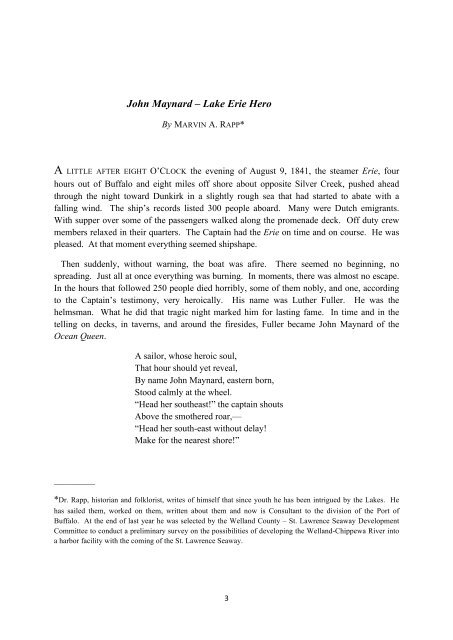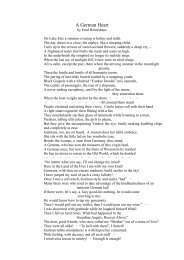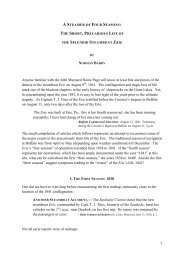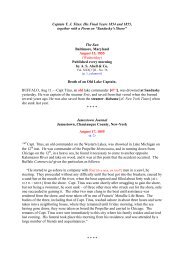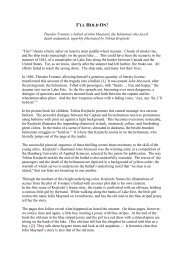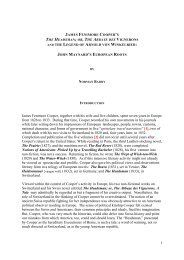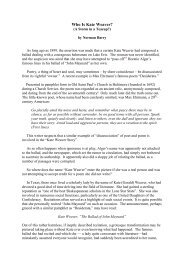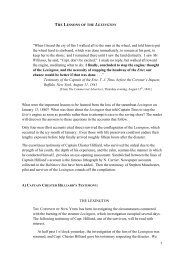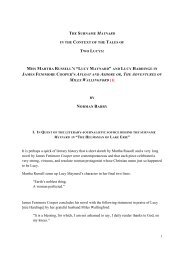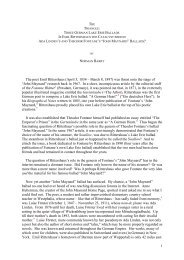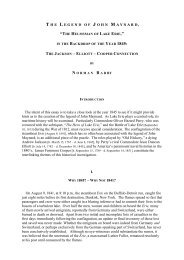"John Maynard - Lake Erie Hero," by Marvin A. Rapp, published in ...
"John Maynard - Lake Erie Hero," by Marvin A. Rapp, published in ...
"John Maynard - Lake Erie Hero," by Marvin A. Rapp, published in ...
You also want an ePaper? Increase the reach of your titles
YUMPU automatically turns print PDFs into web optimized ePapers that Google loves.
<strong>John</strong> <strong>Maynard</strong> – <strong>Lake</strong> <strong>Erie</strong> <strong>Hero</strong><br />
By MARVIN A. RAPP*<br />
A LITTLE AFTER EIGHT O’CLOCK the even<strong>in</strong>g of August 9, 1841, the steamer <strong>Erie</strong>, four<br />
hours out of Buffalo and eight miles off shore about opposite Silver Creek, pushed ahead<br />
through the night toward Dunkirk <strong>in</strong> a slightly rough sea that had started to abate with a<br />
fall<strong>in</strong>g w<strong>in</strong>d. The ship’s records listed 300 people aboard. Many were Dutch emigrants.<br />
With supper over some of the passengers walked along the promenade deck. Off duty crew<br />
members relaxed <strong>in</strong> their quarters. The Capta<strong>in</strong> had the <strong>Erie</strong> on time and on course. He was<br />
pleased. At that moment everyth<strong>in</strong>g seemed shipshape.<br />
Then suddenly, without warn<strong>in</strong>g, the boat was afire. There seemed no beg<strong>in</strong>n<strong>in</strong>g, no<br />
spread<strong>in</strong>g. Just all at once everyth<strong>in</strong>g was burn<strong>in</strong>g. In moments, there was almost no escape.<br />
In the hours that followed 250 people died horribly, some of them nobly, and one, accord<strong>in</strong>g<br />
to the Capta<strong>in</strong>’s testimony, very heroically. His name was Luther Fuller. He was the<br />
helmsman. What he did that tragic night marked him for last<strong>in</strong>g fame. In time and <strong>in</strong> the<br />
tell<strong>in</strong>g on decks, <strong>in</strong> taverns, and around the firesides, Fuller became <strong>John</strong> <strong>Maynard</strong> of the<br />
Ocean Queen.<br />
_________<br />
A sailor, whose heroic soul,<br />
That hour should yet reveal,<br />
By name <strong>John</strong> <strong>Maynard</strong>, eastern born,<br />
Stood calmly at the wheel.<br />
“Head her southeast!” the capta<strong>in</strong> shouts<br />
Above the smothered roar,—<br />
“Head her south-east without delay!<br />
Make for the nearest shore!”<br />
*Dr. <strong>Rapp</strong>, historian and folklorist, writes of himself that s<strong>in</strong>ce youth he has been <strong>in</strong>trigued <strong>by</strong> the <strong>Lake</strong>s. He<br />
has sailed them, worked on them, written about them and now is Consultant to the division of the Port of<br />
Buffalo. At the end of last year he was selected <strong>by</strong> the Welland County – St. Lawrence Seaway Development<br />
Committee to conduct a prelim<strong>in</strong>ary survey on the possibilities of develop<strong>in</strong>g the Welland-Chippewa River <strong>in</strong>to<br />
a harbor facility with the com<strong>in</strong>g of the St. Lawrence Seaway.<br />
3
Folk heroes come <strong>in</strong> assorted shapes, sizes, places, and deeds. By their very nature they<br />
come from the imag<strong>in</strong>ation of people. Stories and songs of their <strong>in</strong>credible acts have<br />
brightened the lonel<strong>in</strong>ess of the Wiscons<strong>in</strong> woods, the river water of the Ohio and Mississippi<br />
Rivers, the roll<strong>in</strong>g countryside of America’s Midwest, and the frontier trails of the far west.<br />
Each section claimed its favorite: the woodsman, Paul Bunyan; the keelman, Mike F<strong>in</strong>k.<br />
These are the superman variety. The rural areas preferred the milder <strong>John</strong>ny Appleseed. The<br />
west exaggerated real characters, like Bowie, and Crocker, <strong>in</strong>to frontier heroes. S<strong>in</strong>ce the<br />
stories about them deal with elemental vices and virtues, they are readily understood and<br />
easily loved. most of the stories have their foundations <strong>in</strong> truth, but <strong>in</strong> the tell<strong>in</strong>g and<br />
retell<strong>in</strong>g, writ<strong>in</strong>g and rewrit<strong>in</strong>g, the orig<strong>in</strong>al facts are often embellished beyond recognition.<br />
Here is the real story of <strong>John</strong> <strong>Maynard</strong>, <strong>Lake</strong> <strong>Erie</strong> hero.<br />
It could have been just an ord<strong>in</strong>ary day — that is of course if any day could be ord<strong>in</strong>ary on<br />
the Buffalo waterfront dur<strong>in</strong>g the 1840’s. In those days most of Europe seemed to be pour<strong>in</strong>g<br />
through the <strong>Erie</strong> Canal and <strong>in</strong>to emigrant steamers headed west from Buffalo for the wild<br />
frontier beyond. Several of the vessels closely nuzzled together <strong>in</strong> the Buffalo harbor had a<br />
head of steam ready for the trip up the lakes. Into their holds, dock wholloppers rolled<br />
household goods, hardware, dry-goods, and package freight. The loaders bawled out orders to<br />
hurry it up. passengers scurry<strong>in</strong>g <strong>in</strong> and around the high piled freight crowded onto the<br />
gangplank. At this moment — the moment be<strong>in</strong>g four o’clock — most of the raucous<br />
confusion centered around the steamboat <strong>Erie</strong>, which was about ready to leave.<br />
Boat runners went about their bus<strong>in</strong>ess with their customary gusto: pull<strong>in</strong>g, push<strong>in</strong>g,<br />
punch<strong>in</strong>g, persuad<strong>in</strong>g. Over a hundred Dutch emigrants walked down Commercial Street<br />
toward the <strong>Erie</strong>. Dressed <strong>in</strong> the traditional garb of their country, they made a colorful and<br />
picturesque parade as they boarded the vessel for what they hoped would be their promised<br />
land. Each clutched a carpet bag as if his life depended on it. In a sense it did. Most of them<br />
were carry<strong>in</strong>g their life’s sav<strong>in</strong>gs <strong>in</strong> specie <strong>in</strong> their bag as a grubstake <strong>in</strong> the new land.<br />
Occassionally an expletive Me<strong>in</strong> Gott, Be Jabbers, Gott <strong>in</strong> Himmel, would crackle out above<br />
the normal harbor<br />
4
noises. Close beh<strong>in</strong>d the emigrants six pa<strong>in</strong>ters followed with their pa<strong>in</strong>t pots, brushes, and<br />
turpent<strong>in</strong>e. They were employees of W. G. Miller’s steamboat pa<strong>in</strong>t<strong>in</strong>g company of Buffalo,<br />
on their way to <strong>Erie</strong>, Pennsylvania to repa<strong>in</strong>t and decorate the steamer James Madison.<br />
Stand<strong>in</strong>g head above the crowd just to the side of the pa<strong>in</strong>ters was a clean shaven youth of 17<br />
years, dressed <strong>in</strong> the uniform of a United states Military Academy Cadet. He seemed to be<br />
try<strong>in</strong>g to look older than he actually was.<br />
From the rail<strong>in</strong>g of the boat stood a group of ladies dressed <strong>in</strong> the latest fashions wav<strong>in</strong>g<br />
and call<strong>in</strong>g to the people below. Some of them scattered co<strong>in</strong>s to the Canal Street urch<strong>in</strong>s<br />
who were rapp<strong>in</strong>g out dance rhythms on the dock boards. The band gaily decked <strong>in</strong> brightly<br />
colored uniforms played some of the lively tunes of the day. Stand<strong>in</strong>g apart from this group<br />
of ladies was Maria Jones. Her dress and manner also told a story. Her l<strong>in</strong>eage was strictly<br />
Canal Street. To the <strong>in</strong>itiated, that meant only one th<strong>in</strong>g. Hav<strong>in</strong>g served her apprenticeship<br />
there, she was now on her way west to open her own establishment at a western <strong>Lake</strong> port.<br />
The 300 passengers and crew represented a cross section of society. Rich and poor, moral<br />
and immoral, banker and laborer, theist and atheist. All com<strong>in</strong>g from different parts of the<br />
world, all filled with hopes and plans for the future. Now for a short time they would all be<br />
rid<strong>in</strong>g the same boat, go<strong>in</strong>g <strong>in</strong> the same direction, and shar<strong>in</strong>g similar experiences.<br />
Aboard the ship, meanwhile, the crew busied themselves with their respective duties. The<br />
chief and second mate checked the freight as it was stowed <strong>in</strong> the hold. In the eng<strong>in</strong>e room,<br />
fires were be<strong>in</strong>g stoked. At the tiller stood Luther Fuller. Carefully he checked the wheel and<br />
rudder. Few men had a steadier hand on the wheel than Fuller. About 28 years old, he<br />
seemed to have been bred to the water. The Capta<strong>in</strong> had great faith <strong>in</strong> him. Outside the<br />
wheelhouse stood Capta<strong>in</strong> T. J. Titus survey<strong>in</strong>g and supervis<strong>in</strong>g the work below. Capta<strong>in</strong><br />
Titus was about 33 years old. For most of his life, he had been associated with shipp<strong>in</strong>g on<br />
the Great <strong>Lake</strong>s. Start<strong>in</strong>g out as an able bodied seaman at sixteen, he soon worked his way up<br />
to a vessel command; first on the schooners, United States and Aurora, and then on the<br />
steamboats, Ohio and Sandusky. S<strong>in</strong>ce the <strong>Erie</strong> was first built and launched at <strong>Erie</strong>,<br />
Pennsylvania, he had been its master. This was her fourth season. Titus loved<br />
5
his ship. She was a magnificent vessel of over 500 tons with a very strong draft — the equal<br />
of any on the <strong>Lake</strong>s.<br />
When everyth<strong>in</strong>g seemed <strong>in</strong> order, Titus picked up his trumpet and shouted to the hands to<br />
cast off. The whole boat shuddered as the steam breathed life <strong>in</strong>to the hull. Slowly the paddle<br />
wheels began to turn. They churned up the water. Luther Fuller headed her bow for the open<br />
lake. By his side stood Andy Blila, call boy, watch<strong>in</strong>g his every move. Some day he hoped to<br />
be a wheelsman like Fuller. Right now no job <strong>in</strong> the whole world seemed so important, and to<br />
Andy no one did it so well as Fuller.<br />
When safely away from the deck, Capta<strong>in</strong> Titus entered his cab<strong>in</strong> and took out his log.<br />
Under the day and date of Monday, august 9, 1841, he noted that the <strong>Erie</strong> had left port at 4.10<br />
headed for Dunkirk. He also noted that a fresh w<strong>in</strong>d from the south and west had roughed up<br />
the lake. After complet<strong>in</strong>g his entry, Titus returned to the deck. The ship had already passed<br />
the light which marked the entrance to the harbor. passengers, however, were still l<strong>in</strong>ger<strong>in</strong>g<br />
on the promenade deck; some were still hang<strong>in</strong>g over the rails wav<strong>in</strong>g to the people on the<br />
dock. The fa<strong>in</strong>t stra<strong>in</strong>s of the band could still be heard above the low rumble of the eng<strong>in</strong>es.<br />
Titus liked a happy ship. He was very proud of the <strong>Erie</strong>. Everyth<strong>in</strong>g seemed to sh<strong>in</strong>e<br />
brightly. The metal sparkled. The wood bore the high polish of new varnish. In fact, the boat<br />
had just recently been repa<strong>in</strong>ted <strong>in</strong>side and out. It had the pleasant smell of newness. As<br />
Titus looked about at the passengers, everyone seemed <strong>in</strong> a gay mood. Already many had<br />
begun to get acqua<strong>in</strong>ted. In the ladies cab<strong>in</strong> there was talk of the latest fashions. The pa<strong>in</strong>ters<br />
sitt<strong>in</strong>g fore told each other the latest bawdy jokes, roared with laughter, and speculated on<br />
what women would be available <strong>in</strong> <strong>Erie</strong>. The cadet stand<strong>in</strong>g <strong>in</strong> the bow look<strong>in</strong>g forward<br />
toward Cleveland was th<strong>in</strong>k<strong>in</strong>g how f<strong>in</strong>e it would be to be home for a while. The Capta<strong>in</strong><br />
walked along the rail to the stern of the ship, passed the time of day with Fuller and watched<br />
Buffalo fade out <strong>in</strong> the distance. Another voyage seemed safely under way. Fuller had<br />
managed to squeeze the <strong>Erie</strong> out of the crowded harbor without scratch<strong>in</strong>g a paddle wheel<br />
fender. It promised to be just another ord<strong>in</strong>ary trip.<br />
6
After Titus had satisfied himself that everyth<strong>in</strong>g was <strong>in</strong> correct order, he returned to his<br />
cab<strong>in</strong> to prepare for d<strong>in</strong>ner usually served at five-thirty. D<strong>in</strong>ner the first night out often set the<br />
tone for the entire trip. He wanted to make sure the first meal out was happy and congenial.<br />
In the wheelhouse, Luther Fuller cont<strong>in</strong>ued to hold a true course west <strong>by</strong> southwest as<br />
ordered. Below <strong>in</strong> the hold, the eng<strong>in</strong>eers fired for full speed ahead. One of the firemen on<br />
an <strong>in</strong>spection detail spotted several demijohns of turpent<strong>in</strong>e atop a ledge which covered the<br />
boilers. realiz<strong>in</strong>g the danger, he quickly removed them to a safer spot on the promenade deck.<br />
In the meantime, however, one of the pa<strong>in</strong>ters returned and notic<strong>in</strong>g that someone had moved<br />
their bottles of turpent<strong>in</strong>e picked them up and put them back where they had been placed<br />
orig<strong>in</strong>ally. He was of course unaware of the danger.<br />
With supper over, the guests walked leisurely along the promenade deck. Occasionally<br />
lights could be seen on the south shore. Straight ahead was <strong>in</strong>ky blackness. Capta<strong>in</strong> Titus<br />
himself strolled along the deck and stopped not far from the pilot’s house. It was now a little<br />
after eight o’clock. The Capta<strong>in</strong> had been pleased with the d<strong>in</strong>ner. He calculated that his ship<br />
was just about opposite Silver Creek about eight miles from the shore. While the w<strong>in</strong>d had<br />
begun to abate slightly, the sea was still rough.<br />
Then suddenly, there was a sound like an explod<strong>in</strong>g bottle. It was audible only to those <strong>in</strong><br />
the immediate vic<strong>in</strong>ity of the demijohns. A puff of smoke like a cloud of coal dust followed<br />
the sound. Those who heard sucked <strong>in</strong> their breath <strong>in</strong> terror. Before anyone could say<br />
anyth<strong>in</strong>g, a red, lurid, flame reached out fir<strong>in</strong>g everyth<strong>in</strong>g about it. In those few awful<br />
moments the whole boat heard the most feared words aboard ship, “Fire.”<br />
Capta<strong>in</strong> Titus stand<strong>in</strong>g near<strong>by</strong> saw the fire com<strong>in</strong>g out of the escape pipe before he heard<br />
the yell. Skylights started crack<strong>in</strong>g from the <strong>in</strong>tense heat. The space between the decks was<br />
already filled with a dense red flame. Smoke poured out of the hold. Titus act<strong>in</strong>g almost<br />
<strong>in</strong>st<strong>in</strong>ctively quickly turned to the bow of the ship and said to the wheelsman, “Fuller, put the<br />
wheel hard to the starboard, rema<strong>in</strong> at your post, and keep the boat headed for the shore.”<br />
Panic had already seized the passengers. By now the entire hold was on afire. The new pa<strong>in</strong>t<br />
and varnish fed the flames. Desperate men pulled up boards from the deck and threw them<br />
<strong>in</strong>to the<br />
7
water. They then jumped <strong>in</strong>to the water hop<strong>in</strong>g to grab hold of the board for support. In their<br />
frenzy few were able to catch hold when they came to the surface. From the cab<strong>in</strong>s came the<br />
screams of those trapped beh<strong>in</strong>d doors, A sheet of flame blocked any hope of gett<strong>in</strong>g to the<br />
cab<strong>in</strong>s from the outside. The sicken<strong>in</strong>g sweet smell of burn<strong>in</strong>g flesh m<strong>in</strong>gled with the smell<br />
of freshly pa<strong>in</strong>ted wood. Out on the water the dy<strong>in</strong>g gasps of the drown<strong>in</strong>g could be heard.<br />
Curses were mixed with prayers. Most seemed to prefer drown<strong>in</strong>g to burn<strong>in</strong>g. That seemed<br />
to be the tragic choice opened to them.<br />
Still see<strong>in</strong>g what he could do, Titus tried to get the eng<strong>in</strong>eer to stop the eng<strong>in</strong>es <strong>in</strong> the hope<br />
that that would slacken speed and would lessen the fann<strong>in</strong>g of the flames. The <strong>in</strong>tense heat<br />
made it impossible to unhook the gear. He yelled to Fuller to cont<strong>in</strong>ue to hold fast to his<br />
course. Already flames had spread to the wheelhouse.<br />
When Titus attempted to get to the ladies’ cab<strong>in</strong>, the fall<strong>in</strong>g beams and flames drove him<br />
back. Inside were the life preservers which now would save no lives. He then ran forward to<br />
help with the launch<strong>in</strong>g of a lifeboat. No sooner did they manage to get it <strong>in</strong> the water than<br />
twenty people swamped it. Those tossed <strong>in</strong>to the water struggled to stay afloat. Their arms<br />
flayed desperately at the air and water. Fear froze their faces. One <strong>by</strong> one they would grow<br />
quiet and slip beneath the water. Once aga<strong>in</strong> the spot would grow calm.<br />
From the promenade deck, attempts were be<strong>in</strong>g made to lower the last boat. As hands<br />
hoisted it over the side, about twenty people appeared from nowhere. As soon as the boat hit<br />
the water, they were over the sides. Like the others, the boat tipped over. With<strong>in</strong> twenty<br />
m<strong>in</strong>utes they were all drowned. Four men who had been swimm<strong>in</strong>g about grabbed hold of the<br />
keel. Titus looked about the deck. He could see no one. The boat was still headed for the<br />
shore. Apparently Fuller was still at his post, but it was so completely cut off <strong>by</strong> flames and<br />
smoke that it was impossible to see. When there seemed to be noth<strong>in</strong>g more he could do,<br />
Titus jumped <strong>in</strong>to the water. With an assist from a Negro swimm<strong>in</strong>g near the overturned boat,<br />
the Capta<strong>in</strong> was able to grab a part of the keel.<br />
All about him he could hear the screams of those who were drown<strong>in</strong>g. He looked at the<br />
boat. It was still head<strong>in</strong>g for shore. All the upper works had burned away. The hull was a<br />
dull red flame. It pa<strong>in</strong>ted pictures of<br />
8
ed devils danc<strong>in</strong>g on the black waters. As the w<strong>in</strong>d whipped the flames, it sounded to Titus<br />
like the roar of a hurricane. At the stern of the vessel, several people tried to climb down the<br />
tiller cha<strong>in</strong>s to the rudder. The cha<strong>in</strong> was almost red hot. As each one grabbed hold, the heat<br />
burned their hands. Then, with a scream of terror, they would fall <strong>in</strong>to the water. The flesh<br />
from their hands hang<strong>in</strong>g <strong>in</strong> shreds from the cha<strong>in</strong> l<strong>in</strong>ks. Titus noticed one man who seemed,<br />
despite the pa<strong>in</strong>, to be mak<strong>in</strong>g it down. Squ<strong>in</strong>t<strong>in</strong>g his eyes to get better distance, Capta<strong>in</strong><br />
Titus noticed that it was the young cadet. Hand over hand he lowered himself down the<br />
cha<strong>in</strong>. The pa<strong>in</strong> must have been almost unbearable. F<strong>in</strong>ally he made it to the rudder. He<br />
straddled the rudder and dipped his hands, burned raw <strong>by</strong> the hot cha<strong>in</strong>, <strong>in</strong>to the water to<br />
relieve the pa<strong>in</strong>. By soak<strong>in</strong>g his coat <strong>in</strong> the water and wett<strong>in</strong>g the area <strong>in</strong> front of him he was<br />
able to fight back the flames. He seemed older now than his 17 years.<br />
By now it was harder to dist<strong>in</strong>guish anyth<strong>in</strong>g on the boat. Titus noticed several cl<strong>in</strong>g<strong>in</strong>g <strong>by</strong><br />
their f<strong>in</strong>gertips to the deck edge. Afraid to drop and yet as the flames ate closer f<strong>in</strong>d<strong>in</strong>g it<br />
impossible to cont<strong>in</strong>ue to hang on. One <strong>by</strong> one the flames cut them down. The most tragic<br />
scenes of all were those of parents try<strong>in</strong>g desperately and frantically to save their children.<br />
The end was always the same. It would be but a matter of moments when all would go down.<br />
Near the bulkhead the Capta<strong>in</strong> watched <strong>in</strong> horrified fasc<strong>in</strong>ation a person surrounded <strong>by</strong> fire,<br />
hold<strong>in</strong>g a piece of cloth <strong>in</strong> his hand. He appeared to be bath<strong>in</strong>g his face to relieve the pa<strong>in</strong>.<br />
All the while he was scream<strong>in</strong>g for help. Then the flames hid him from view.<br />
After two hours <strong>in</strong> the water, Titus noticed a two-stacked boat rac<strong>in</strong>g toward them. When it<br />
was over only fifty people were rescued. Two hundred and fifty people had lost their lives.<br />
Maria Jones would never open her house. The ladies would never aga<strong>in</strong> bother about<br />
fashions. The girls <strong>in</strong> <strong>Erie</strong> would have to forego the pleasures of the six pa<strong>in</strong>ters who had<br />
turned a gay boat <strong>in</strong>to a funeral pyre. The emigrants would never reach the prairie land of the<br />
west.<br />
What of the wheelsman whom Titus told to hold his course until they reached the shore? In<br />
the <strong>in</strong>quest follow<strong>in</strong>g the tragedy, Capta<strong>in</strong> Titus paid a hero’s tribute to Luther Fuller, the<br />
wheelsman. “He rema<strong>in</strong>ed at<br />
9
the wheel and never left it until he was burned to death.” And then Titus added, “He was<br />
always a resolute man.”<br />
It could have been just another day and just another trip and Fuller could have rema<strong>in</strong>ed<br />
just another sailor.<br />
But this is the stuff folk heroes are made of. Among canallers and sailors, Fuller’s fame<br />
spread. <strong>in</strong> many a waterfront saloon and on the deck of many a laker his story was told over<br />
and over aga<strong>in</strong>. He became the symbol of the courage and strength of all <strong>Lake</strong> <strong>Erie</strong> sailors.<br />
By 1845 his story was common property. An English traveller and writer on tour through<br />
the <strong>Lake</strong>s apparently heard the story and wrote it down. In September of that year it appeared<br />
<strong>in</strong> the Buffalo Commercial Advertiser and the follow<strong>in</strong>g month <strong>in</strong> the Western Literary<br />
Messenger under the title “Helmsman of <strong>Lake</strong> <strong>Erie</strong>.” One authority believes the author was<br />
Charles Dickens, who toured the lakes <strong>in</strong> 1845.<br />
Several alterations were made and much embellishment added to the orig<strong>in</strong>al story. The<br />
writer rechristened the <strong>Erie</strong> the Jersey and anglicized <strong>Lake</strong> term<strong>in</strong>ology. He aged Fuller<br />
considerable, renamed him <strong>John</strong> <strong>Maynard</strong>, and endowed him with all the virtues.<br />
*Old <strong>John</strong> <strong>Maynard</strong> was at the wheel – a bluff, weather-beaten sailor, tanned <strong>by</strong> many a w<strong>in</strong>try tempest.<br />
He had truly learnt to be contented with his situation: none could ever say that they ever heard him<br />
rep<strong>in</strong>e at his hard labor and scanty pay. He had, <strong>in</strong> the worst times, a cheerful word and a k<strong>in</strong>d look for<br />
those with whom he was thrown – cast often enough <strong>in</strong>to bad company, he tried, at least, and generally<br />
succeeded, to say someth<strong>in</strong>g for its good. He was known, from one end of <strong>Lake</strong> <strong>Erie</strong> to the other, <strong>by</strong> the<br />
name of honest <strong>John</strong> <strong>Maynard</strong>; and the secret of his honesty to his neighbors was – his love of God.<br />
Conversation between the capta<strong>in</strong> and his crew was added for dramatic emphasis.<br />
“Dick Fletcher, What’s all that smoke I see com<strong>in</strong>g out from the hold?”<br />
“ It’s from the eng<strong>in</strong>e room, sir, I guess,” said the man.<br />
“Down with you, then, and let me know.”<br />
The sailor began descend<strong>in</strong>g the ladder <strong>by</strong> which you go to the hold; but scarcely had he<br />
disappeared beneath the deck, when he came up with much greater speed.<br />
“The hold’s on fire, sir,” he said to the capta<strong>in</strong>, who <strong>by</strong> this time was stand<strong>in</strong>g close to him.<br />
The capta<strong>in</strong> rushed down, and found the account too true. Some sparks had fallen on a bundle of<br />
tow; no one had seen the accident; and now not only much of the luggage, but the sides of the vessel<br />
were <strong>in</strong> smoulder<strong>in</strong>g flame.<br />
All hands, passengers as well as sailors, were called together; and two l<strong>in</strong>es<br />
[*Transcriber’s note: <strong>Rapp</strong>’s lengthy excerpt from “Helmsman of <strong>Lake</strong> <strong>Erie</strong>” is not from the Buffalo Commercial<br />
Advertiser [A-version], September 12, 1845, but from the Western Literary Messenger, also Buffalo, N.Y., [Bversion],<br />
Oct. 4, 1845. Miss<strong>in</strong>g words, both here and <strong>in</strong> Alger’s ballad, have been added <strong>in</strong> angled brackets:<br />
< >.]<br />
10
e<strong>in</strong>g made, one on each side of the hold, buckets of water were passed and repassed; they were filled<br />
from the lake, flew along a l<strong>in</strong>e of ready hands, were dashed hiss<strong>in</strong>g on the burn<strong>in</strong>g mass, and<br />
then passed on to the other side to be refilled.<br />
For some m<strong>in</strong>utes, it seemed as if the flames were subdued.<br />
In the meantime the women on board were cluster<strong>in</strong>g round <strong>John</strong> <strong>Maynard</strong>, the only man<br />
unemployed who was capable of answer<strong>in</strong>g their questions. “How far is it to land?” “How long shall<br />
we be gett<strong>in</strong>g <strong>in</strong>?” The helmsman answered as well<br />
as he could. There was no boat: it had been left at Buffalo to be mended. they might be seven miles<br />
from shore; they would probably be <strong>in</strong> <strong>in</strong> forty m<strong>in</strong>utes; he could not tell how far the fire had reached.<br />
“And, to speak the truth,” he added, “we are all <strong>in</strong> great danger, and I th<strong>in</strong>k if there was a little less<br />
talk<strong>in</strong>g, and a little more pray<strong>in</strong>g, it would be the better for us, and none the worse for the boat.”<br />
“How’s her head?” shouted the capta<strong>in</strong>.<br />
“West-sou’west,” answered <strong>Maynard</strong>.<br />
“Keep her south <strong>by</strong> west,” cried the capta<strong>in</strong> —<br />
“We must go on shore any where.”<br />
It happened that a draft of w<strong>in</strong>d drove back the flames, which soon began to blaze up more<br />
furiously aga<strong>in</strong>st the saloon; and the partition betwixt it and the hold was soon on fire. Then long<br />
wreaths of smoke began to f<strong>in</strong>d way through the sky light; and the capta<strong>in</strong> see<strong>in</strong>g this, ordered all the<br />
women forward. The eng<strong>in</strong>eer put on his utmost steam, the American flag was run up, and reversed, <strong>in</strong><br />
token of distress; water was flung over the sails, to make them hold the w<strong>in</strong>d. And still <strong>John</strong> <strong>Maynard</strong><br />
stood <strong>by</strong> the wheel, tho’ now he was cut off, <strong>by</strong> a sheet of smoke and flame, from the ship’s crew.<br />
Greater and greater grew the heat. the eng<strong>in</strong>eers fled from the eng<strong>in</strong>e room – the passengers were<br />
cluster<strong>in</strong>g round the vessel’s bow, the sailors were saw<strong>in</strong>g planks on which to lash the women, the<br />
boldest were throw<strong>in</strong>g off their coats and waistcoats, and prepar<strong>in</strong>g for one long struggle for life. And<br />
still the coast grew pla<strong>in</strong>er and pla<strong>in</strong>er; the paddles, as yet worked well, they could not be more than a<br />
mile from the shore; and boats were even now start<strong>in</strong>g to their assistance.<br />
“<strong>John</strong> <strong>Maynard</strong>!” cried the capta<strong>in</strong>.<br />
“Aye, aye, Sir!” said <strong>John</strong>.<br />
“Can you hold on five m<strong>in</strong>utes longer?”<br />
And he did try; the flames came nearer and nearer; a sheet of smoke would sometimes almost<br />
suffocate him; and his hair was s<strong>in</strong>ged — his blood seemed on fire with the great heat. Crouch<strong>in</strong>g as<br />
far back as he could, he held the wheel firmly with his left hand, till the flesh shrivelled, and the<br />
muscles crackled <strong>in</strong> the flame; and then he stretched forth his right, and bore the agony without a<br />
scream or a groan. It was enough for him that he heard the cheer of the sailors to the approach<strong>in</strong>g<br />
boats; the cry of the capta<strong>in</strong>, “The women first, and then every man for himself, and God for us all.”<br />
And they were the last sounds that he heard. How he perished was not known; whether, dizzied <strong>by</strong> the<br />
smoke, he lost his foot<strong>in</strong>g <strong>in</strong> endeavor<strong>in</strong>g to come forward, and fell overboard, or whether he was<br />
suffocated <strong>by</strong> dense smoke, his comrades could not tell. — At the moment the vessel struck the boats<br />
were at her side; passengers, sailors, and capta<strong>in</strong> leaped <strong>in</strong>to them, or swam for their lives; all, save he<br />
to whom they owed every th<strong>in</strong>g, escaped.<br />
11
He had died the death of a christian hero – I had almost said, of a martyr; his spirit was<br />
commended <strong>in</strong>to his Father’s hands, and his body sleeps <strong>in</strong> peace <strong>by</strong> the green side of <strong>Lake</strong> <strong>Erie</strong>.<br />
Probably more than anyth<strong>in</strong>g else, this account gave <strong>John</strong> <strong>Maynard</strong> to the world. In 1875<br />
the story was turned <strong>in</strong>to poetry. Authorship has been attributed to Horatio Alger, Jr., who<br />
made his fortune as a writer of dime novels, and to Kate weaver. The <strong>Erie</strong> <strong>in</strong> this work<br />
receives its third and f<strong>in</strong>al name, the Ocean Queen.<br />
’Twas on <strong>Lake</strong> <strong>Erie</strong>’s broad expanse<br />
One bright midsummer day,<br />
The gallant steamer Ocean Queen<br />
Swept proudly on her way.<br />
Bright faces clustered on the deck,<br />
Or, lean<strong>in</strong>g o’er the side,<br />
Watched carelessly the feathery foam<br />
That flecked the rippl<strong>in</strong>g tide.<br />
Ah, who beneath the cloudless sky,<br />
That smil<strong>in</strong>g bends serene,<br />
Could dream that danger awful vast,<br />
Impended o’er the scene,—<br />
Could dream that ere an hour had sped<br />
That frame of sturdy oak<br />
Would s<strong>in</strong>k beneath the lake’s blue <br />
Blackened with fire and smoke?<br />
A seaman sought the capta<strong>in</strong>'s side,<br />
A moment whispered low;<br />
The capta<strong>in</strong>'s swarthy face grew pale;<br />
He hurried down below.<br />
Alas, too late! Though quick, and sharp,<br />
And clear his orders came,<br />
No human efforts could avail<br />
To quench the <strong>in</strong>sidious flame.<br />
The bad news quickly reached the deck,<br />
It sped from lip to lip,<br />
And ghastly faces everywhere<br />
Looked from the doomed ship.<br />
"Is there no hope--no chance of life?"<br />
A hundred lips implore,<br />
"But one," the capta<strong>in</strong> made reply,<br />
"To run the ship on shore."<br />
A sailor, whose heroic soul<br />
That hour should yet reveal,<br />
By name <strong>John</strong> <strong>Maynard</strong>, eastern-born,<br />
12
Stood calmly at the wheel.<br />
"Head her south-east!" the capta<strong>in</strong> shouts,<br />
Above the smothered roar,--<br />
"Head her south-east without delay!<br />
Make for the nearest shore!"<br />
No terror pales the helmsman's cheek,<br />
Or clouds his dauntless eye,<br />
As, <strong>in</strong> a sailor's measured tone,<br />
His voice responds, "Ay! ay!"<br />
Three hundred souls, the steamer's freight,<br />
Crowd forward wild with fear,<br />
While at the stern the dreaded flames<br />
Above the deck appear.<br />
<br />
He grasped the wheel, and steadfastly<br />
He steered the ship to land.<br />
"<strong>John</strong> <strong>Maynard</strong>, can you still hold out?"<br />
He heard the capta<strong>in</strong> cry;<br />
A voice from out the stifl<strong>in</strong>g smoke<br />
Fa<strong>in</strong>tly responds, "Ay! ay!"<br />
But half a mile! a hundred hands<br />
Stretch eagerly to shore.<br />
But half a mile! That distance sped<br />
Peril shall all be o'er.<br />
But half a mile! Yet stay, the flames<br />
No longer slowly creep,<br />
But gather round that helmsman bold,<br />
With fierce, impetuous sweep.<br />
"<strong>John</strong> <strong>Maynard</strong>!" with an anxious voice<br />
The capta<strong>in</strong> cries once more,<br />
"Stand <strong>by</strong> the wheel five m<strong>in</strong>utes yet,<br />
And we shall reach the shore."<br />
Through flame and smoke that dauntless heart<br />
Responded firmly still,<br />
Unawed, though face to face with death,--<br />
"With God's good help I will!"<br />
The flames approach with giant strides,<br />
They scorch his hand and brow;<br />
One arm, disabled, seeks his side,<br />
Ah! he is conquered now!<br />
But no, his teeth are firmly set,<br />
He crushes down his pa<strong>in</strong>,<br />
His knee upon the stanchion pressed,<br />
He guides the ship aga<strong>in</strong>.<br />
13
One moment yet! one moment yet!<br />
Brave heart, thy task is o'er,<br />
The pebbles grate beneath the keel.<br />
The steamer touches shore.<br />
Three hundred grateful voice rise<br />
In praise to God that he<br />
Hath saved them from the fearful fire,<br />
And from the engulph<strong>in</strong>g sea.<br />
But where is he, that helmsman bold?<br />
The capta<strong>in</strong> saw him reel,--<br />
His nerveless hands released their task,<br />
He sank beside the wheel.<br />
The wave received his lifeless corpse,<br />
Blackened with smoke and fire.<br />
God rest him! Never hero had<br />
A nobler funeral pyre!<br />
In 1901, <strong>John</strong> Gough, temperance leader, turned the poem <strong>in</strong>to a prose oration entitled “The<br />
Pilot,” and used it as a part of his vast repertoire on cross country tours. It had real punch. It<br />
eventually appeared <strong>in</strong> many school elocution books. School children memorized it. It soon<br />
reached overseas. Theodore Fontane, German poet, translated the story and poem <strong>in</strong>to<br />
German. Eventually it was set to music.<br />
Some <strong>in</strong> the United States th<strong>in</strong>k <strong>John</strong> Hay, L<strong>in</strong>coln’s secretary, had this story <strong>in</strong> m<strong>in</strong>d when<br />
he wrote “Jim Bludso.” Leastwise the Mississippi story bears a strik<strong>in</strong>g resemblance to the<br />
<strong>Maynard</strong> story.<br />
And the fire broke out as she clared the bar,<br />
And burnt a hole <strong>in</strong> the night,<br />
And quick as a flash she turned, and made<br />
For the willer-bank on the right.<br />
There was runn<strong>in</strong>' and curs<strong>in</strong>', but Jim yelled out,<br />
Over all the <strong>in</strong>fernal roar,<br />
"I'll hold her nozzle ag<strong>in</strong> the bank<br />
Till the last galoot's ashore."<br />
Through the hot, black breath of the burn<strong>in</strong>’ boat<br />
Jim Bludso's voice was heard,<br />
And they all had faith <strong>in</strong> his cussedness,<br />
And knowed he would keep his word.<br />
And, sure as you're born, they all got off<br />
Before the smokestacks fell, --<br />
And Bludso's ghost went up alone<br />
In the smoke of the Prairie Belle.<br />
14
<strong>John</strong> <strong>Maynard</strong>, or Luther Fuller, might have rested <strong>in</strong> his fame if it had not been for<br />
a revelation made <strong>in</strong> 1912. Over the years, all the writers who wrote their accounts<br />
from the orig<strong>in</strong>al stories <strong>in</strong> the newspapers or from other accounts which had<br />
themselves been based on the testimony of Capta<strong>in</strong> Titus, assumed that Luther Fuller<br />
or <strong>John</strong> <strong>Maynard</strong>, as they called him, went down with his ship. This was one of the<br />
few po<strong>in</strong>ts upon which all agreed.<br />
On November 22, 1900, a man died <strong>in</strong> the <strong>Erie</strong> County Hospital, <strong>Erie</strong>,<br />
Pennsylvania. His name was James Rafferty. He was a common drunkard, a<br />
convicted counterfeiter and a pauper. Little notice would have been paid to his<br />
pass<strong>in</strong>g if the secretary of the <strong>Erie</strong> Historical Society had not <strong>in</strong> 1912 revealed that<br />
Rafferty was actually Luther Fuller, the <strong>John</strong> <strong>Maynard</strong> of <strong>Lake</strong> <strong>Erie</strong> fame. Accord<strong>in</strong>g<br />
to him, Fuller had stayed with the ship until all had left and then when the rudder<br />
ropes had burned and it was useless for him to stay aboard, he cut away a part of the<br />
paddle wheel fender and floated ashore. He had been badly burned.<br />
Credence was placed immediately <strong>in</strong> the secretary’s story because he had been little<br />
Andy Blila, the call boy on the <strong>Erie</strong> the night it burned. Fuller often came <strong>in</strong>to his<br />
father’s saloon, Blila claimed, to borrow a dime for a dr<strong>in</strong>k. So it was that the man<br />
who had been capable, at least once <strong>in</strong> his life, of ris<strong>in</strong>g to such great heights died a<br />
convicted crim<strong>in</strong>al and drunkard, not far from the water where he had played out his<br />
heroic deed. But whatever happened to James Rafferty, <strong>John</strong> <strong>Maynard</strong> would always<br />
rema<strong>in</strong> the hero of <strong>Lake</strong> <strong>Erie</strong>.<br />
15


